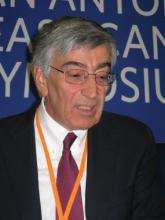SAN ANTONIO – Bevacizumab improved progression-free survival when added to standard treatment in a study of more than 400 women with HER2-positive locally recurrent or metastatic breast cancer.
That finding, which emerged from the AVEREL trial, adds another wrinkle in the ongoing controversy regarding use of bevacizumab (Avastin) in breast cancer treatment.
For the primary end point of investigator-assessed progression-free survival (PFS), conducted at a median follow-up of 26 months, the addition of bevacizumab resulted in a hazard ratio of 0.82 (P = .0775), compared with treatment with trastuzumab and docetaxel alone. This difference was not statistically significant. Median investigator-assessed PFS was 16.5 months with bevacizumab, compared with 13.7 months without it.
In an assessment by an independent review committee (IRC), however, a significant improvement in PFS was seen with the addition of bevacizumab (hazard ratio, 0.72; P = .0162). Median IRC-assessed PFS was 16.8 months with bevacizumab, compared with 13.9 months without it.
Lead investigator Dr. Luca Gianni reported the results at the San Antonio Breast Cancer Symposium. AVEREL is a randomized, placebo-controlled phase III trial designed to evaluate bevacizumab combined with trastuzumab (Herceptin) and docetaxel (Taxotere) as first-line therapy for HER2-positive, locally recurrent or metastatic breast cancer.
The findings add more data to support the effectiveness of the drug in particular subpopulations of patients with metastatic breast cancer.
In November 2011, the Food and Drug Administration announced it was revoking its approval of the metastatic breast cancer indication for bevacizumab after concluding the drug had not been shown safe and effective for that use.
Many in the breast cancer community consider the agency’s decision unwarranted. "Bevacizumab improves the response rate – about doubles it – which for my symptomatic patients is a clear benefit," said press conference moderator Dr. Lisa Carey, professor in the department of medicine at the University of North Carolina at Chapel Hill. "It improves the progression-free survival to a greater or lesser degree in every trial that it’s ever been studied."
She conceded that "it doesn’t do anything to overall survival." The FDA cited the lack of improvement in overall survival for metastatic breast cancer patients in its decision. Dr. Gianni noted, however, that "Survival is a very important end point, but it’s not the only end point in metastatic breast cancer."
Dr. Carey agreed. "I would love to have the availability of the drug routinely for my symptomatic patients, in whom I would like to have more than one agent given – particularly one that’s well-tolerated as [bevacizumab] is."
Patients were eligible for the AVEREL trial if they had measurable or evaluable HER2-positive locally recurrent or metastatic breast cancer with an Eastern Cooperative Oncology Group (ECOG) performance status of 0-1. They could not have received prior chemotherapy for advanced disease. Patients with central nervous system metastases were excluded.
The researchers enrolled 424 women with previously untreated disease. The women were randomized to receive either trastuzumab plus docetaxel (n = 208) or the same regimen plus bevacizumab (n = 216). Intravenous trastuzumab was given with an 8-mg/kg loading dose that was followed by a dosage of 6 mg/kg given every 3 weeks. Docetaxel was given intravenously at a dosage of 100 mg/m2 given every 3 weeks. Bevacizumab was given intravenously at a dosage of 15 mg/kg every 3 weeks.
Trastuzumab and bevacizumab were given until disease progression. Docetaxel was given for a planned minimum of six cycles or until progression or unacceptable toxicity occurred. The primary end point was investigator-assessed PFS. Secondary end points included overall survival (OS), overall response rate, duration of response, time to treatment failure, safety (including adverse events of special interest for bevacizumab), and quality of life. Exploratory analyses included PFS evaluated by an IRC (to comply with FDA recommendations) and biomarker assessment.
In terms of safety, "There were no new safety signals observed in this patient population with respect to what we really know from other patient populations exposed to Avastin," said Dr. Gianni, director of medical oncology at the San Raffaele Cancer Center in Milano, Italy.
The researchers also conducted an exploratory analyses of plasma vascular endothelial growth factor-alpha (VEGF-A). Their results suggest a potentially predictive effect – greater benefit with high VEGF-A levels – that are consistent with observations in HER2-negative locally recurrent or metastatic breast cancer.
The AVEREL trial was sponsored by Hoffman-La Roche. Dr. Gianni has disclosed that he is a consultant to Roche, Genentech, GSK, Wyeth, Novartis, Eisai, Pfizer, Millennium Takeda, Sanofi Aventis, Boehringer Ingelheim, Biogen Idec, AstraZeneca, Genomic Health, and Celgene. Dr. Carey reported that she has no relevant financial relationships to disclose.

